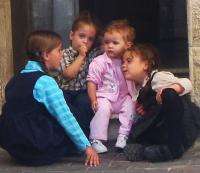September 24, 2013 report
Research suggests childhood abuse could cause multiple health problems in adults

(Medical Xpress)—Childhood abuse is associated with an increased risk of life-threatening conditions, such as heart disease and metabolic syndrome, in adulthood. Some researchers think constant stress in childhood creates a situation in which multiple regulatory systems are constantly prepared to respond to threats. This causes wear and tear on the body, increasing susceptibility to disease later in life. In a study appearing in the Proceedings of the National Academy of Sciences, Judith Carroll of the University of California, Los Angeles and her colleagues have established a correlation between high levels of childhood abuse and cumulative health risk.
Research shows a correlation exists between abuse in childhood and an increased risk of severe health problems later in life. It's not clear how events that occurred in childhood can affect health decades later. One hypothesis suggests that constant stress in childhood reprograms the neural circuitry that influences how systems throughout the body respond to stress. However, most studies of the effects of childhood abuse on adult health have focused on separate body systems, so have not tested this hypothesis.
Carroll and her colleagues devised a way to study the relationship between abuse in childhood and overall health risk. They examined 18 biological markers, including heart rate, blood pressure, cholesterol level and blood glucose level, of 756 participants in the Coronary Artery Risk Development in Young Adults (CARDIA) study and used this data to determine health risk. The researchers then had the participants fill out a questionnaire describing their childhood environments.
The team found that participants who had experienced the most abuse and least parental affection in childhood were most likely to have multiple health risks as adults. Those who experienced parental love and affection, despite also having experienced abuse, received some protection from these risks. Participants with the highest levels of parental warmth and no histories of abuse had the lowest adult health risks. These correlations persisted even when adjusting for childhood socioeconomic status. Low socioeconomic status is associated with exposure to stressful environments.
Carroll's team acknowledges a number of problems with the study. Participants answered questions about their childhoods based on memory. It's possible that adults with more health problems are more likely to remember negative childhood events. However, the team has found no evidence that this is so. In addition, the study did not account for factors other than abuse that might affect childhood stress levels, such as nutrition, environmental pollution or a genetic propensity towards aggression.
More information: Childhood abuse, parental warmth, and adult multisystem biological risk in the Coronary Artery Risk Development in Young Adults study, Published online before print September 23, 2013, DOI: 10.1073/pnas.1315458110
Abstract
Childhood abuse increases adult risk for morbidity and mortality. Less clear is how this "toxic" stress becomes embedded to influence health decades later, and whether protective factors guard against these effects. Early biological embedding is hypothesized to occur through programming of the neural circuitry that influences physiological response patterns to subsequent stress, causing wear and tear across multiple regulatory systems. To examine this hypothesis, we related reports of childhood abuse to a comprehensive 18-biomarker measure of multisystem risk and also examined whether presence of a loving parental figure buffers against the impact of childhood abuse on adult risk. A total of 756 subjects (45.8% white, 42.7% male) participated in this ancillary substudy of the Coronary Artery Risk Development in Young Adults Study. Childhood stress was determined by using the Risky Families Questionnaire, a well-validated retrospective self-report scale. Linear regression models adjusting for age, sex, race, parental education, and oral contraceptive use found a significant positive relationship between reports of childhood abuse and multisystem health risks [B (SE) = 0.68 (0.16); P < 0.001]. Inversely, higher amounts of reported parental warmth and affection during childhood was associated with lower multisystem health risks [B (SE) = ?0.40 (0.14); P < 0.005]. A significant interaction of abuse and warmth (P < 0.05) was found, such that individuals reporting low levels of love and affection and high levels of abuse in childhood had the highest multisystem risk in adulthood.
© 2013 Medical Xpress
















